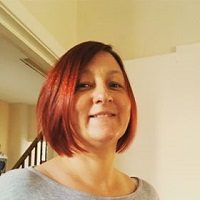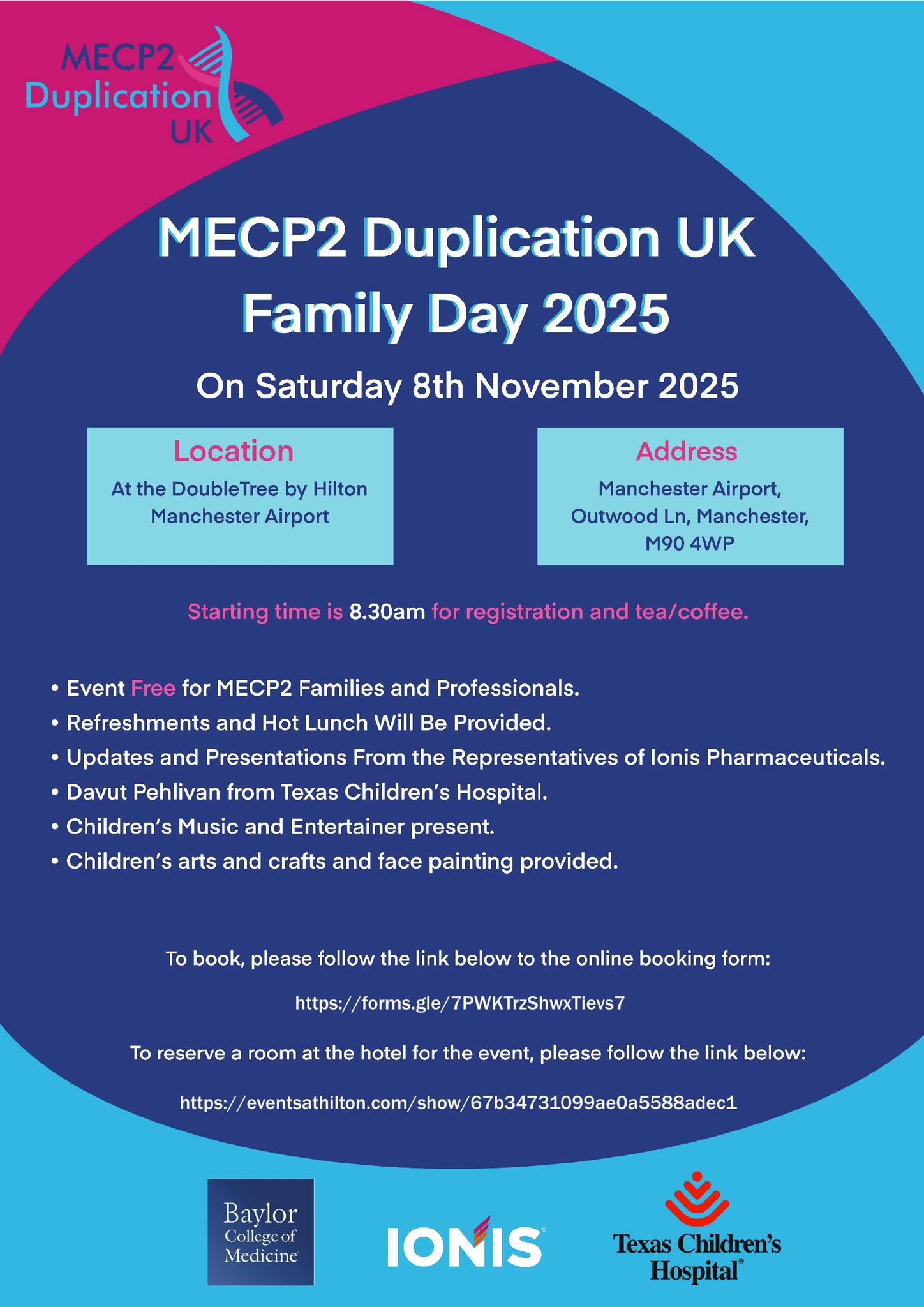Call Us On – 0770 420 1468
What is MECP2 duplication syndrome?
MECP2 Duplication Syndrome is a rare genetic disorder that affects the development of the brain and nervous system. It is caused by having an extra copy of a gene called MECP2, which plays a crucial role in regulating the activity of other genes in the body. This syndrome predominantly affects boys, but in rare instances it can be seen in females (especially if there is a translocation).
The symptoms of MECP2 Duplication Syndrome mostly appear early in infancy, and they often involve weak muscle tone causing delays in obtaining developmental skills such as sitting up, standing, walking, holding objects, reaching on time. Most individuals have very little or no speech. Seizures mostly start between age 5-10 years and become resistant to treatment options. Gastrointestinal problems including gastroesophageal reflux, chewing/swallowing difficulties and constipation are highly prevalent in MECP2 Duplication Syndrome individuals. Frequent upper airway infections are more common in the early childhood and lung infections (pneumonia) become more prominent especially with uncontrolled seizures. Additionally, sleep disturbances are common among individuals with MECP2 Duplication Syndrome, including problems with falling asleep or staying asleep throughout the night.
Since the clinical features of MECP2 Duplication Syndrome are not specific, the diagnosis relies on genetic testing such as array CGH, SNP array and next generation sequencing.
Because MECP2 Duplication Syndrome is a genetic condition, it is present from birth and cannot be cured. However, early intervention and supportive care can make a significant difference in improving the quality of life for individuals with this syndrome. A multidisciplinary approach involving healthcare professionals from various specialties, such as neurology, physical therapy, speech therapy, occupational therapy, gastroenterologist, and pulmonologist is often necessary to address the different challenges associated with MECP2 Duplication Syndrome.
Research is ongoing to better understand the underlying mechanisms of MECP2 Duplication Syndrome and to develop potential treatments. Scientists are exploring different approaches, such as antisense oligonucleotide therapy and siRNA-mediated therapy to potentially correct the genetic abnormalities associated with this syndrome. While these treatments are still in the experimental stages, they offer hope for the near future.
Living with MECP2 Duplication Syndrome can present unique challenges for individuals and their families, but it’s important to remember that every person with this syndrome is unique and has their own strengths and abilities. Supportive care, early intervention programs, and a strong support network can help individuals with MECP2 Duplication Syndrome reach their full potential and lead fulfilling lives.
In conclusion, MECP2 Duplication Syndrome is a rare genetic disorder that affects the development of the brain and nervous system. It causes a range of symptoms, including developmental delays, intellectual disabilities, motor difficulties, seizures, frequent respiratory infections, and other health issues. While there is currently no cure, early intervention and supportive care can make a significant difference. Ongoing research holds promise for potential future treatments. With appropriate support, individuals with MECP2 Duplication Syndrome can thrive and live fulfilling lives.
Common characteristics of MECP22 are:
Hypotonia: At birth or during the first weeks or months of life these infants typically have low muscle tone. In most cases, low muscle tone persists in the face and trunk into adult life.
Increasing limb spasticity: Over time, the low muscle tone in the limbs is replaced by excessive muscle tone, particularly in the legs. The progression from hypertonia may be seen in childhood but may not occur until adolescence or even adulthood.
Gastroesophageal Re-flux: Reflux has been noted in about 80% of cases.
Significantly Delayed Developmental Milestones: Rolling over, sitting, and other motor milestones are significantly delayed. Some individuals never walk independently others begin walking at 3-5 years of age or older. Those who do walk typically have a wide unsteady gait.
Severe or profound intellectual disabilities: Severe or profound intellectual disabilities have been reported in almost all cases.
Limited language: Most individuals are described as having more receptive language and understanding much of what is said to them. Many individuals are described as losing language skills as they get older. A study conducted by Lugtenberg and colleagues report no speech in 82% of the 55 cases observed.
Developmental regression; The loss of motor and language skills over time has been reported in many but not all individuals. Regression frequently occurs around the same time as the Onset of seizures, but the relationship between these symptoms remains unclear at this time.
Autistic behaviours: Some autistic behaviours, such as hand-flapping and spinning objects, and those who developed speech echolalia, have been observed among many individuals with MECP2 Duplication Syndrome.
Severe and recurrent infections: Infectious disease and pneumonia are major health challenges and the most frequently reported cause of death for individuals with MECP2 Duplication Syndrome. The underlying cause for this is not entirely clear, and may be multifactorial. Functional immune system weakness does appear to be present in many, reflux, swallowing problems, axial hypotonia, and other factors may contribute to the frequency and severity of lower respiratory infections.
Seizures: Seizures are very common, and become more common as children get older. As a result, they are less frequent among younger children, but very frequent by the second decade of life. Many different categories of seizures have been reported among individuals with MECP2 Duplication Syndrome, and frequently many different forms are reported in the same individual with the nature of the seizures changing over time.
Low bone density and fractures: Fractures and poor bone density have been reported frequently. These effects may be associated with diet, anticonvulsant therapy, combined with frequent seizure related falls.
Other common characteristics include drooling, the inability to regulate body temperature adequately, sleep disorders, and bruxism or teeth-grinding.
As this condition is not yet widely known it is important to monitor developmental progress, neurological features including the onset of spasticity and seizures, the frequency and type of infections, gastrointestinal issues and “unusual“ behaviours so that early intervention practices and appropriate therapies can be accessed and utilized.
Who?
We are a charity that assists those who suffer or are affected by MECP2 Duplication Syndrome.
What?
We help those with their support needs and other issues, keep reading to find out more.
Where?
We are based in the UK and help those here, if you are not from the UK but still need help, get in contact!
About Us
2012
MECP2 Duplication UK started off as a support group in 2012 but as time went on we realised we were not alone and other families needed help & support.
2014
In 2014 we achieved charity status
Our charity has certain aims we attend to focus our efforts on these are as follows:
– To provide Support emotionally, practically and financially to families affected by MECP2 Duplication Syndrome, reducing isolation and exclusion.
– To Raise Awareness of MECP2 Duplication Syndrome and join up with other relevant organisations.
– To promote and support Research into MECP2 Duplication Syndrome which could potentially lead to treatments, which could enhance the lives of those affected by the syndrome.
– For our charity to grow and develop for the long term benefits of the MECP2 Duplication Syndrome community.

Rhona Connelly Trustee

Asia Chapman Committee Member

Rachel Lund Trustee

Becky Breslin Committee Member

Gosia Zukowska-Alkhatib Trustee

Sharon Gordine Committee Member


